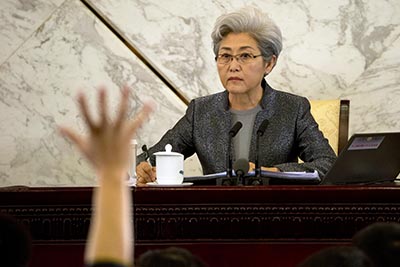In November 2013, delays and some outright refusals in issuing visas for foreign correspondents in China were making headlines. A few months later, in its March 2014 survey of members, the Foreign Correspondents’ Club of China (FCCC) described the situation as “grim.” An emailed report on results of the most recent survey (which can be viewed here) found the visa registration process was smoother than in previous years, but “Chinese authorities are continuing to abuse the press card and visa renewal process in a political manner.”
The findings, based on a survey emailed to 216 members in January, added that authorities were “treating journalistic accreditation as a privilege rather than a professional right, and punishing reporters and media organizations for the content of their previous coverage if it has displeased the government.”
Visas are being issued in a timely manner for most correspondents, according to the survey to which 126 members replied. But government warnings to international journalists whose work had displeased authorities “constitute a gross and persistent breach of international standards, by which journalists’ visas should be issued on the basis of professional criteria, not of their previous reporting,” the emailed summary of the findings said.
According to the FCCC, 10 journalists said they were threatened with having visas cancelled or not renewed because of their work. One member, who was not named in the findings, said: “I had two interviews where I was questioned about my reporting on Xinjiang and told that the Foreign Ministry would need to be satisfied with my attitude in order to approve my press card.” The press card was issued, but the remarks show a concerning attitude from officials.
CPJ took part in discussions in February about visas at meetings in New York that included several Americans with influence within the U.S. policy making sphere. Many of them had a growing frustration with China’s apparent abuse of visas not just for journalists but also scholars who, according to news reports, have been denied entry for seeking to delve into issues the government would rather not publicize. The problem of visas for scholars has been around for quite a while; see Perry Link’s New York Review of Books essay China: The Anaconda in the Chandelier from 2002. When coupled with reports on the blocking of access to many foreign mainstream media websites, there is a sense that China, if not winning the information war, is at least out-maneuvering foreign countries in controlling the flow of information.
One of the streams of thought, put forward in the discussions last month, was that there should be some degree of measured reciprocity: International journalists aren’t getting visas in China? Then, Chinese journalists in affected countries should be dealt with in a similar manner, some policy makers at the meetings proposed. That is not a positon CPJ takes– in China or elsewhere in the world. In June 2012, we cautioned against the passage of proposed House Bill H.R. 2899, the Chinese Media Reciprocity Act of 2011. The aim of the bill was to pressure Beijing into allowing more Voice of America reporters into China.
Back in 2012 we said, “We don’t believe that the best response to press freedom restrictions in China is to implement press freedom restrictions in the U.S. We don’t approve of the use of specific visas for journalists in the first place, although we recognize that it is a widespread practice. In an ideal world, we would see as many journalists as possible in all countries, moving as freely as possible across borders.” Because of such opposition, and not just from CPJ, H.R. 2899 never matured into a law.
But since November 2012, when President Xi Jinping’s government came into power, the space for international and domestic reporters has shrunk at a phenomenal rate. There are too many alerts, reports, and blogs on CPJ to link to that support the claim, so it is best to simply go to the China section of our website and start scrolling through. Last year China found itself at the top of the list of jailed journalists, a dubious distinction it has held many times before. Under Xi, China has moved into a period of media suppression. The cycle of tightening and loosening of press freedom has continued for decades, but this period seems headed to depths similar to that of the Mao era, and for the same reasons: to ensure the predominance of the Communist Party.
The best way for this era of abuse to be addressed is for all the countries whose journalists have been affected to bring pressure on the Xi government to end the practice of using journalists as pawns. This is a global problem: reporters should not be used in a power play to control access to any other country. For other countries to resort to the same tactics that China employs and start tossing out reporters–as some policy makers have suggested–is to fall backwards in the argument that the free flow of information makes the world a better place.
In 2012 we wrote: “The U.S., or any country, should not threaten to drive possibly hundreds of journalists from within its borders for any reason. Such a move might feed some people’s sense of justice, but would be short-sighted, counterproductive, and contradict one of the United States’ cornerstone liberties.” To that I would add that in this period of broadening attacks on media freedom, from terrorist threats to liberal nations’ heightened surveillance of communication, it is more important than ever to avoid resorting to restricting the freedom of journalists no matter where they are working.
To view the FCCC email report on the January 2015 survey, reproduced with the FCCC’s permission, click here.
